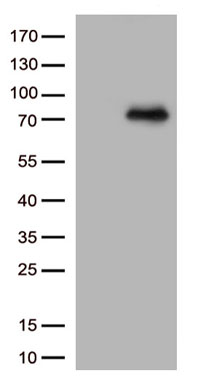PKC alpha (PRKCA) Mouse Monoclonal Antibody [Clone ID: OTI3D2]
CAT#: CF813397
Carrier-free (BSA/glycerol-free) PRKCA mouse monoclonal antibody, clone OTI3D2
Size: 25 Slides
Frequently bought together (2)
Other products for "PKC alpha"
Specifications
| Product Data | |
| Clone Name | OTI3D2 |
| Applications | WB |
| Recommended Dilution | WB 1:500-1000 |
| Reactivities | Human, Mouse, Rat |
| Host | Mouse |
| Isotype | IgG2a |
| Clonality | Monoclonal |
| Immunogen | Human recombinant protein fragment corresponding to amino acids 350-672 of human PRKCA (NP_002728) produced in E.coli. |
| Formulation | Lyophilized powder (original buffer 1X PBS, pH 7.3, 8% trehalose) |
| Reconstitution Method | For reconstitution, we recommend adding 100uL distilled water to a final antibody concentration of about 1 mg/mL. To use this carrier-free antibody for conjugation experiment, we strongly recommend performing another round of desalting process. (OriGene recommends Zeba Spin Desalting Columns, 7KMWCO from Thermo Scientific) |
| Purification | Purified from mouse ascites fluids or tissue culture supernatant by affinity chromatography (protein A/G) |
| Conjugation | Unconjugated |
| Storage | Shipped at -20°C or with ice packs, Upon delivery store at -20°C. Dilute in PBS(pH7.3) if necessary. Stable for 12 months from date of receipt. Avoid repeated freeze-thaws. |
| Stability | Stable for 12 months from date of receipt. |
| Predicted Protein Size | 76.6 kDa |
| Gene Name | protein kinase C alpha |
| Database Link | |
| Background | Protein kinase C (PKC) is a family of serine- and threonine-specific protein kinases that can be activated by calcium and the second messenger diacylglycerol. PKC family members phosphorylate a wide variety of protein targets and are known to be involved in diverse cellular signaling pathways. PKC family members also serve as major receptors for phorbol esters, a class of tumor promoters. Each member of the PKC family has a specific expression profile and is believed to play a distinct role in cells. The protein encoded by this gene is one of the PKC family members. This kinase has been reported to play roles in many different cellular processes, such as cell adhesion, cell transformation, cell cycle checkpoint, and cell volume control. Knockout studies in mice suggest that this kinase may be a fundamental regulator of cardiac contractility and Ca(2+) handling in myocytes. [provided by RefSeq, Jul 2008]. |
| Synonyms | AAG6; PKC-alpha; PKCA; PKCalpha; PKCI+/-; PRKACA |
| Reference Data | |
| Protein Families | Druggable Genome, ES Cell Differentiation/IPS, Protein Kinase |
| Protein Pathways | Calcium signaling pathway, ErbB signaling pathway, Fc epsilon RI signaling pathway, Fc gamma R-mediated phagocytosis, Focal adhesion, Gap junction, Glioma, GnRH signaling pathway, Leukocyte transendothelial migration, Long-term depression, Long-term potentiation, MAPK signaling pathway, Melanogenesis, Natural killer cell mediated cytotoxicity, Non-small cell lung cancer, Pathogenic Escherichia coli infection, Pathways in cancer, Phosphatidylinositol signaling system, Tight junction, Vascular smooth muscle contraction, VEGF signaling pathway, Vibrio cholerae infection, Wnt signaling pathway |
Documents
| Product Manuals |
| FAQs |
| SDS |
Resources
| Antibody Resources |
{0} Product Review(s)
0 Product Review(s)
Submit review
Be the first one to submit a review
Product Citations
*Delivery time may vary from web posted schedule. Occasional delays may occur due to unforeseen
complexities in the preparation of your product. International customers may expect an additional 1-2 weeks
in shipping.






























































































































































































































































 Germany
Germany
 Japan
Japan
 United Kingdom
United Kingdom
 China
China





